 W
WAntanas Baranauskas was a Lithuanian poet, mathematician and Catholic bishop of Sejny. Baranauskas is best known as the author of the Lithuanian poem Anykščių šilelis. He used various pseudonyms, including A.B., Bangputys, Jurksztas Smalaūsis, Jurkštas Smalaūsis, and Baronas. He also wrote poetry in Polish.
 W
WVladimiras Beresniovas, known under his pen name Vlaber (Влабер) is a Lithuanian artist, humorist, poet, and cartoonist. Vlaber has been an active participant in the Lithuanian and world artistic communities for more than 40 years. In the last 10 years, he has illustrated more than 100 books, published weekly cartoons in the local newspapers, and been named to Who's Who in Lithuania in 2008.
 W
WJonas Biliūnas was a Lithuanian writer, poet, and a significant contributor to the national awakening of Lithuania in the late 19th and early 20th centuries.
 W
WKazys Binkis was a Lithuanian poet, journalist, and playwright. He used the pseudonyms K. Alijošius, K. Papilietis, Kazys, Kazys Roviejietis, Nedarbininkas, Neklaipėdietis, Nelatvis, Nepartyvis, Ras Desta, Riza Chanas, and others.
 W
WKazys Boruta was a Lithuanian writer, poet and political activist.
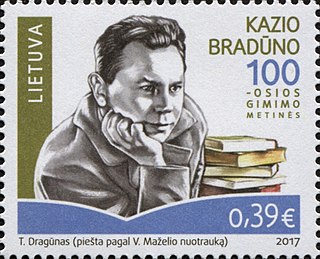 W
WKazys Bradūnas was a Lithuanian émigré poet and editor. He was born in Kiršai, in the Lithuania District of Ober Ost, a territory occupied by the German Empire.
 W
WBernardas Brazdžionis was a Lithuanian poet. Bernardas Brazdžionis also used various pen names, such as Vytė Nemunėlis, Jaunasis Vaidevutis.
 W
WPetras Cvirka was a Lithuanian author of several novels, children's books, and short story collections. He wrote under a variety of noms de plume: A. Cvingelis, Cezaris Petrėnas, J. K. Pavilionis, K. Cvirka, Kanapeikus, Kazys Gerutis, Klangis, Klangis Petras, Klangių Petras, L. P. Cvirka, Laumakys, P. Cvinglis, P. Cvirka-Rymantas, P. Gelmė, P. Veliuoniškis, Petras Serapinas, and S. Laumakys. His works have been translated into Belarusian, Bulgarian, Chinese, Czech, English, Estonian, Hungarian, Latvian, Polish, Romanian, and Uzbek.
 W
WAleksandras Dičpetris was a Lithuanian poet and educator. He first published poetry in 1923 and continued publishing in college. He studied Germanistics and Lithuanian philology and pedagogy at Vytautas Magnus University, belonged to the “tent society” and graduated in 1933. The melodic quatrain collection Dalia Necklace published in 1930 alternates between symbolist and neoromantic styles. In 1931 his poem entitled Lithuania Our Motherland drew notable attention.
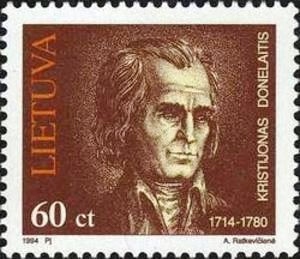 W
WKristijonas Donelaitis was a Prussian Lithuanian poet and Lutheran pastor. He lived and worked in Lithuania Minor, a territory in the Kingdom of Prussia, that had a sizable Lithuanian-speaking minority. He wrote the first classic Lithuanian language poem, The Seasons, which became one of the principal works of Lithuanian poetry. The poem, a classic work of Lithuanian literature, depicts everyday life of Lithuanian peasants, their struggle with serfdom, and the annual cycle of life.
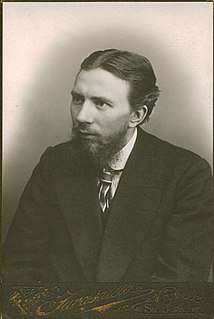 W
WLiudas Gira was a Lithuanian poet, writer, and literary critic. His is noted for his early poetry, which resembles traditional Lithuanian folk songs. Gira was active in cultural and political life, gradually shifting towards communism in 1930s. He supported the Soviet Union and helped to transform independent Lithuania into the Lithuanian Soviet Socialist Republic. His son, Vytautas Sirijos Gira, is also a known poet and writer.
 W
WJuozas Glinskis is a Lithuanian playwright.
 W
WMotiejus Gustaitis was a Lithuanian Symbolist poet, who used numerous pseudonyms. He was also a translator and educator, as well as a Catholic priest. A long-term chairman of the Žiburys Society, Gustaitis worked to establish Lithuanian schools and advocated girls' education. He worked as principal of girls' pro-gymnasium in Marijampolė and coed gymnasium in Lazdijai.
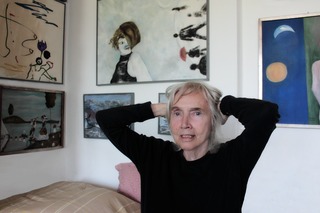 W
WAldona Gustas is a Lithuanian – German poet and illustrator who has lived in Berlin since the early 1940s.
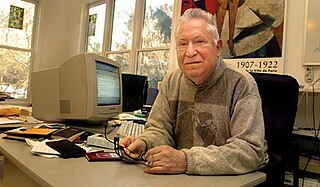 W
WBenjamin Harshav, born Hrushovski ; June 26 1928 – April 23 2015 was a literary theorist specialising in comparative literature, a Yiddish and Hebrew poet, and an Israeli translator and editor. He served as professor of literature at the University of Tel Aviv and as a professor of comparative literature, Hebrew language and literature, and Slavic languages and literature at Yale University. He was the founding editor of the Duke University Press publication Poetics Today. He received the EMET Prize for Art, Science and Culture in 2005 and was a member of the American Academy of Arts and Sciences.
 W
WButkų Juzė was the pen name of Juozas Butkus, a Lithuanian educator, poet, playwright and journalist. He worked for numerous newspapers from 1910 onwards, including Aušrinė, Žemaitis, Lietuvos žinios, and Naujojoje Lietuvoje. In 1932 he was inducted into the Lithuanian Journalists' Union. He wrote the play Palaidūnas (Prodigal) in 1925, and translated numerous works into Lithuanian, including Goethe's Egmont. He later worked as a museum curator and teacher at the Klaipėda Pedagogical Institute.
 W
WKostas Kubilinskas was a Lithuanian poet known for his writing for children. Amongst his books is The Frog Queen, a 1974 collection of children's poetry illustrated by Algirdas Steponavicius and translated into English by Avril Pyman.
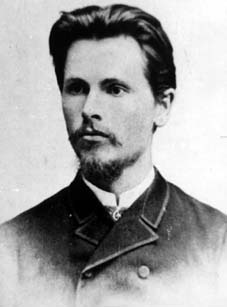 W
WVincas Kudirka was a Lithuanian poet and physician, and the author of both the music and lyrics of the Lithuanian National Anthem, Tautiška giesmė. He is regarded in Lithuania as a National Hero. Kudirka used pen names V. Kapsas, Paežerių Vincas, Vincas Kapsas, P.Vincas, Varpas, Q.D, K., V.K, Perkūnas.
 W
WVytautas Mačernis was a Lithuanian poet.
 W
WMaironis is one of the most famous Lithuanian poets and was also a Catholic priest and educator.
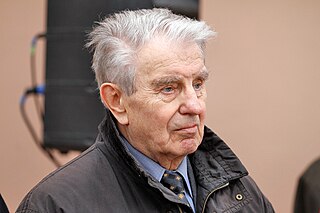 W
WJustinas Marcinkevičius was a prominent Lithuanian poet and playwright.
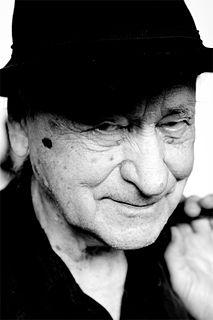 W
WJonas Mekas was a Lithuanian-American filmmaker, poet, and artist who has been called "the godfather of American avant-garde cinema" on many occasions. His work has been exhibited in museums and at festivals worldwide.
 W
WOscar Vladislas de Lubicz Milosz was a French language poet, playwright, novelist, essayist and representative of Lithuania at the League of Nations. His literary career began at the end of the nineteenth century during la Belle Époque and reached its high point in the mid-1920s with the books Ars Magna and Les Arcanes, in which he developed a highly personal and dense Christian cosmogony comparable to that of Dante in The Divine Comedy and John Milton in Paradise Lost. A solitary and unique twentieth-century metaphysician, his poems are visionary and often tormented. He was a distant cousin of Polish writer Czesław Miłosz, winner of the Nobel Prize for literature in 1980.
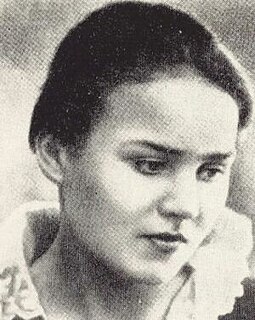 W
WSalomėja Bačinskaitė-Bučienė, mostly known by her pen name Nėris was a Lithuanian poet.
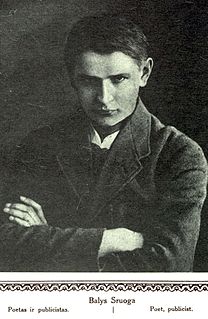 W
WBalys Sruoga was a Lithuanian poet, playwright, critic, and literary theorist.
 W
WAntanas Strazdas was a Lithuanian priest and poet. Because of his humble origins and lifestyle, he became somewhat of a folklore hero.
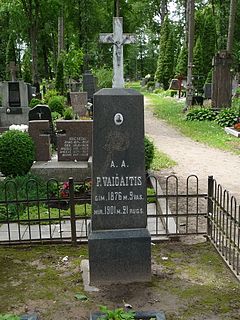 W
WPranas Vaičaitis was a Lithuanian poet. After graduation from the Marijampolė Gymnasium, he studied law at the Saint Petersburg University. Due to the violations of the Lithuanian press ban, he was imprisoned for a month in 1899 and could not find a jurist job. With the help of professor Eduards Volters, he obtained a job at the library of the Russian Academy of Sciences before progressing tuberculosis forced him to return home. He died at the age of 25 and left less than a hundred original poems. His first poems were published in 1896 in Varpas though the vast majority of them were published in Vienybė lietuvninkų, a Lithuanian newspaper published in Plymouth, Pennsylvania. The first collection of his poems was published posthumously in 1903 in the United States. His poems are popular, particularly those about nature in Lithuania, and have been adopted to folk songs. His poetry is sensitive, intimate, without more complex metaphors or lyrical devices, and with a depth of feeling that distinguishes it from other poetry of the period.
 W
WAntanas Venclova was a Lithuanian and Soviet politician, poet, journalist and translator.
 W
WTomas Venclova is a Lithuanian poet, prose writer, scholar, philologist and translator of literature. He is one of the five founding members of the Lithuanian Helsinki Group. In 1977, following his dissident activities, he was forced to emigrate and was deprived of his Soviet citizenship. Since 1980 he has taught Russian and Polish literature at Yale University. Considered a major figure in world literature, he has received many awards, including the Prize of Two Nations, and The Person of Tolerance of the Year Award from the Sugihara Foundation, among other honors.